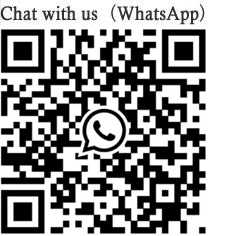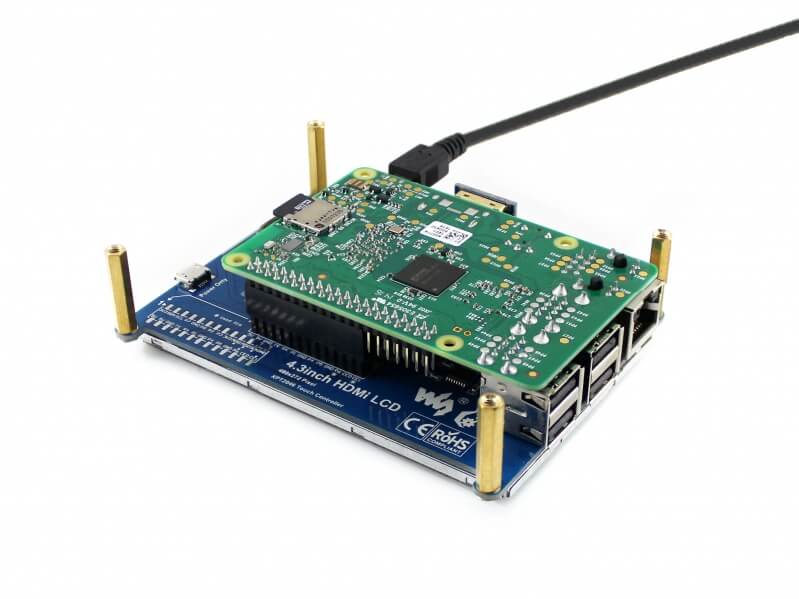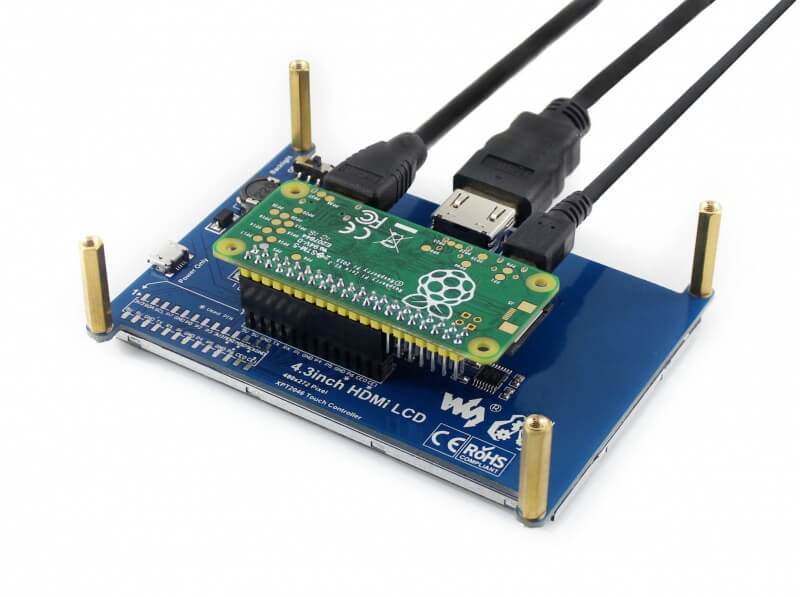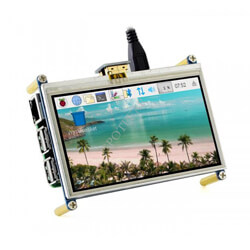- sales/support
Google Chat:---
- sales
+86-0755-88291180
- sales01
sales@spotpear.com
- sales02
dragon_manager@163.com
- support
tech-support@spotpear.com
- CEO-Complaints
zhoujie@spotpear.com
- sales/support
WhatsApp:13246739196
Raspberry Pi 4.3inch HDMI LCD-V1 User Guide
Introduction
4.3inch Resistive Touch Screen LCD, HDMI interface, Designed for Raspberry Pi.
Revisions
- Due to the unstable supply of the main chip TFP401A used by the original 4.3inch HDMI LCD, our new version uses RTD2660H. The compatibility of RTD2660H is better than that of TFP401A, but the power consumption is also higher.
- Users can distinguish whether it is the V1 version (TFP401A) or the V2 version (RTD2660H) by the following two pictures.
V1:
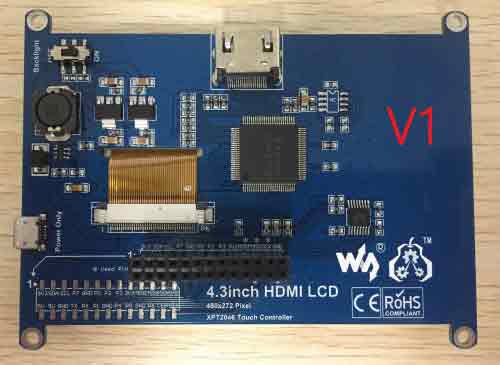
Features
- 480 × 272 hardware resolution.
- Resistive touch control.
- Compatible and Direct-connect with any revision of Raspberry Pi (except the Pi 1 model B or Pi Zero, which requires an HDMI cable).
- Raspbian/Ubuntu Drivers are provided (works with your own Raspbian/Ubuntu directly).
- When only used for display, does not occupy any I/O resources (using touch function will occupy I/O resources).
- Backlight control to lower power consumption.
Getting Started
Hardware Connection
- Plug the LCD to your Raspberry Pi:
- There are 40 pins on Raspberry Pi Model A+/B+/2 B/3 B but only 26 pins on the LCD, so you should pay attention to connecting the pins to your Pi accordingly.
- Connect the HDMI Connector to both the HDMI interfaces on the LCD and the Pi.
- You should connect the LCD to Raspberry Pi Model B or Raspberry Pi Zero with an HDMI cable rather than an HDMI Connector.
- Turn on the "backlight" switch on the back of the LCD. (Only for V1 version)
Note: This product can only work on a Raspberry Pi but not work on a PC. That is, if the HDMI of the LCD is connected to the HDMI on a PC, the LCD will not display anything.
Hardware connection for Raspberry Pi Model A+/B+/2 B/3 B
Hardware connection for Raspberry Pi Zero
Install the touch driver
You can enable the touch in two ways: Method 1. install the driver to your Raspbian/Ubuntu Mate OS. Method 2. use the Ready-to-use image file of which LCD driver was pre-installed.
Method 1. Driver installation
Please download the latest version of the image on the Raspberry Pi official website. (Raspbian/Ubuntu Mate/Kali or Retropie)
1) Download the compressed image file to the PC, and unzip it to get the .img file.
2) Connect the TF card to the PC, and open the Win32DiskImager. software, select the system image downloaded in step 1 and click‘Write’ to write the system image. ( How to write an image to a micro SD card for your Pi? See RPi Image Installation Guides for more details)
3) After the image has finished writing, open the config.txt file in the root directory of the TF card. Add the following code at the end of config.txt, then save and quit the TF card safely.
- For V1 version
max_usb_current=1 hdmi_group=2 hdmi_mode=87 hdmi_timings=480 0 1 41 2 272 0 2 10 2 0 0 0 60 0 9009000 3 display_rotate=2 hdmi_drive=2
If the LCD cannot work with commands above when connecting to Pi 4, please comment/remove the statement dtoverlay=vc4-fkms-V3D on /boot/config.txt and try again.
4) Connect the TF card to the Raspberry Pi, start the Raspberry Pi.The LCD will display after booting up, and then log in to the Raspberry Pi terminal (you can connect the Raspberry Pi to the HDMI display or log in remotely with SSH).
5) Then open the terminal of Raspberry Pi to install the touch driver which can be found in the /boot/ directory. Note: The Raspberry Pi must be connected to the network, or else the touch driver won't be successfully installed.
git clone https://github.com/waveshare/LCD-show.git cd LCD-show/
- For V1 version
chmod +x LCD43-show sudo ./LCD43-show
Touch function will work after restart. For ease of use, you can set the screen orientation, see: #Screen orientation settings.
Method 2. Using Ready-to-use image
The image file with pre-installed driver is located in the IMAGE directory of the CD. Extract the .7z file and you will get an .img file. Write the image to your micro SD card (How to write an image to a micro SD card for your Pi? See RPi Image Installation Guides for more details). Then insert the card to your Pi, power up and enjoy it.
Screen orientation settings
After touch driver installed, the screen orientation can be set by these commands:
For V1 version:
- 0 degree rotation
cd LCD-show/ sudo ./LCD43-show 0
- 90 degree rotation
cd LCD-show/ sudo ./LCD43-show 90
- 180 degree rotation
cd LCD-show/ sudo ./LCD43-show 180
- 270 degree rotation
cd LCD-show/ sudo ./LCD43-show 270
- If you are using Raspbian-lite, the commands should be
- 0 degree rotation
cd LCD-show/ sudo ./LCD43-show lite 0
- 90 degree rotation
cd LCD-show/ sudo ./LCD43-show lite 90
- 180 degree rotation
cd LCD-show/ sudo ./LCD43-show lite 80
- 270 degree rotation
cd LCD-show/ sudo ./LCD43-show lite 270
Touch screen calibration
This LCD can be calibrated through the xinput-calibrator program. Note: The Raspberry Pi must be connected to the network, or else the program won't be successfully installed.
- Run the following command to install:
sudo apt-get install xinput-calibrator
- Click the "Menu" button on the task bar, choose "Preference" -> "Calibrate Touchscreen".
- Finish the touch calibration following the prompts. Maybe rebooting is required to make calibration active.
- You can create a 99-calibration.conf file to save the touch parameters (not necessary if file exists).
sudo mkdir /etc/X11/xorg.conf.d sudo nano /etc/X11/xorg.conf.d/99-calibration.conf
- Save the touch parameters (may differ depending on LCD) to 99-calibration.conf, as shown in the picture:

Install virtual keyboard
1.Execute the following code to install the corresponding software.
sudo apt-get update sudo apt-get install matchbox-keyboard sudo nano /usr/bin/toggle-matchbox-keyboard.sh
2.Copy the following content to toggle-matchbox-keyboard.sh, save and exit.
#!/bin/bash #This script toggle the virtual keyboard PID=`pidof matchbox-keyboard` if [ ! -e $PID ]; then killall matchbox-keyboard else matchbox-keyboard & fi
3.Execute the following code.
sudo chmod +x /usr/bin/toggle-matchbox-keyboard.sh sudo mkdir /usr/local/share/applications sudo nano /usr/local/share/applications/toggle-matchbox-keyboard.desktop
4.Copy the following content to toggle-matchbox-keyboard.desktop, save and exit.
[Desktop Entry] Name=Toggle Matchbox Keyboard Comment=Toggle Matchbox Keyboard` Exec=toggle-matchbox-keyboard.sh Type=Application Icon=matchbox-keyboard.png Categories=Panel;Utility;MB X-MB-INPUT-MECHANSIM=True
5.Execute the following code, this step must use the "pi" user authority, if you use the administrator authority, the file will not be found.
sudo nano /etc/xdg/lxpanel/LXDE-pi/panels/panel
6.Find the code similar to the following.(the icon of different versions may be different)
Plugin {
type = launchbar
Config {
Button {
id=lxde-screenlock.desktop
}
Button {
id=lxde-logout.desktop
}
}
7. Add the following code to add a Button item, as shown below.
Button {
id=/usr/local/share/applications/toggle-matchbox-keyboard.desktop
}
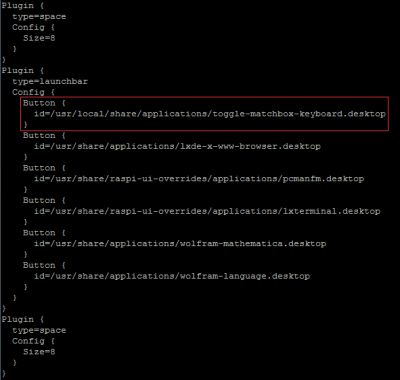
8. Execute the following code to restart the system, you can see a virtual keyboard icon in the upper left corner of the LCD.
sudo reboot
Interface
The pins labeled "NC" below means that those pins of Raspberry Pi are not occupied by the LCD, and the user can use them for other applications.
| PIN NO. | SYMBOL | DESCRIPTION |
|---|---|---|
| 1, 17 | 3.3V | Power positive (3.3V power input) |
| 2, 4 | 5V | Power positive (5V power input) |
| 3, 5, 7, 8, 10, 11, 12, 13, 15, 16, 18, 24 | NC | NC |
| 6, 9, 14, 20, 25 | GND | Ground |
| 19 | TP_SI | SPI data input of Touch Panel |
| 21 | TP_SO | SPI data output of Touch Panel |
| 22 | TP_IRQ | Touch Panel interrupt, low level while the Touch Panel detects touching |
| 23 | TP_SCK | SPI clock of Touch Panel |
| 26 | TP_CS | Touch Panel chip selection, low active |
Resource
User Manual
Driver
The driver can be downloaded from github
git clone https://github.com/waveshare/LCD-show.git
Software
Image
Description: if you felt hard to install driver, try the image with driver pre-installed.
LCD Panel Dimension
FAQ
Question:Why can not the LCD be used normally when using the official image provided by the Raspberry Pi?
Question:Why can not the LCD be used normally when using the Raspberry Pi image provided by waveshare?
- Make sure the hardware connection is correct and the contact is good.
- Make sure that TF card programming is normal.
- When the Raspberry Pi starts normally, the PWR light is always on, and the ACT light is flashing. If it is found that both lights are always on, it may be that the TF card is not successfully programmed to the image or the TF card is in poor contact with the Raspberry Pi.
- It is recommended to use a 5V 2.5A power adapter for the Raspberry Pi. If the Raspberry Pi is powered by the USB port of the PC, the Raspberry Pi may not be able to start normally due to an insufficient power supply.



